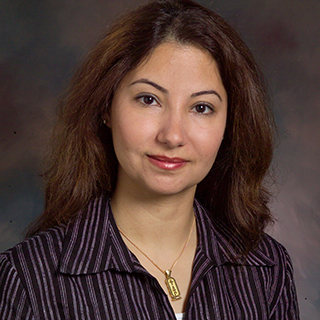Goldis Malek, received her BS and BA degrees in biology and psychology from the University of South Florida and her PhD degree in vision science and physiological optics from the University of Alabama at Birmingham, during which time she developed an interest in studying the pathology and cellular mechanisms underlying retinal diseases. She completed her postdoctoral studies at Duke University in the Department of Ophthalmology. Since 2007, she has been at Duke University where she is currently an Associate Professor, with appointments in the Departments of Ophthalmology and Pathology. She has a strong background in cell biology and a broad understanding of retinal and retinal pigment epithelial cell function in health and disease. This includes the pathology and pathogenic mechanisms involved in dry and wet age-related macular degeneration, an aged disease characterized by accumulation of extracellular debris, cellular degeneration/apoptosis and angiogenesis/neovascularization. Furthermore, she has extensive experience in development of murine models of retinal degeneration.
Dr. Malek’s research focuses on identifying and defining the mechanism of action of nuclear receptors in the aging retina and AMD. To date, her lab has identified several lipid-, steroid hormone-, and toxin-activated nuclear receptors, which may play a role in disease initiation and progression. Her lab utilizes genetic and pharmacological applications and uses in vitro models of retinal pigment epithelial and choroidal endothelial cells, as well as in vivo models. The therapeutic potential of targeting these receptors also is currently under investigation. Presently her labs’ research has been recognized with an Alcon Research Institute Young Investigator Award and a Research to Prevent Blindness award, in addition to BrightFocus funding. Dr. Malek has reviewed grant applications for NEI, serves as a scientific grant review member for several foundations, reviews manuscripts for over 15 journals, and is an editorial board member for Molecular Vision and Current Eye Research.
Duke University
Durham, NC
Durham, NC
